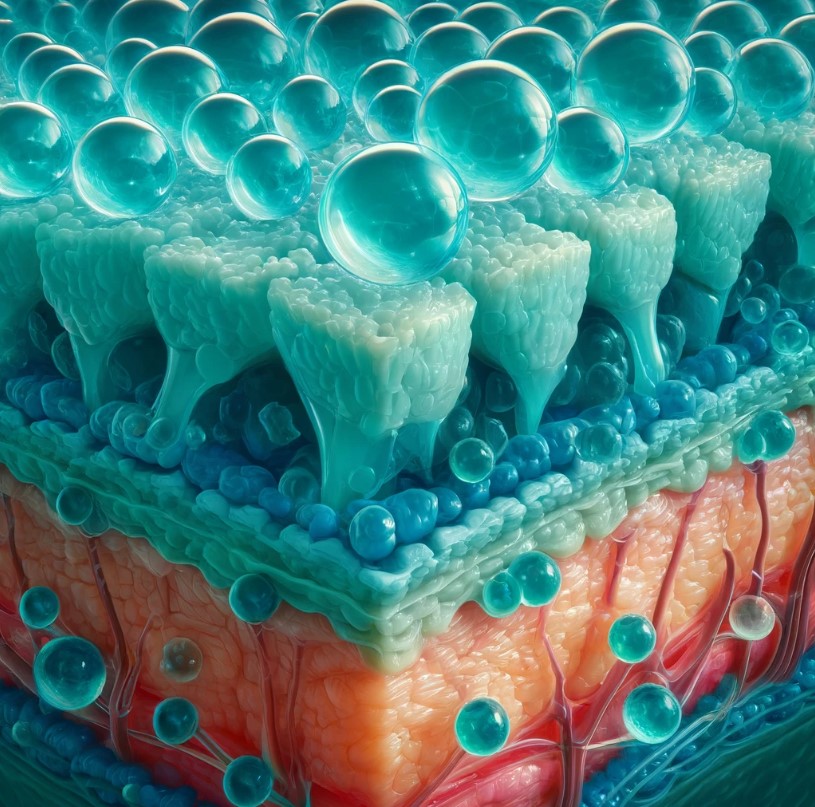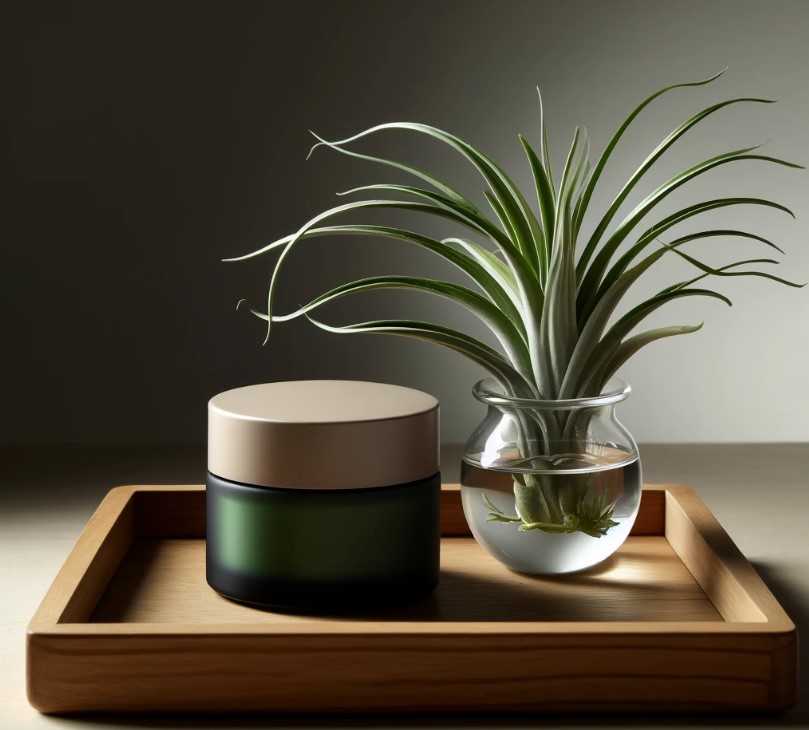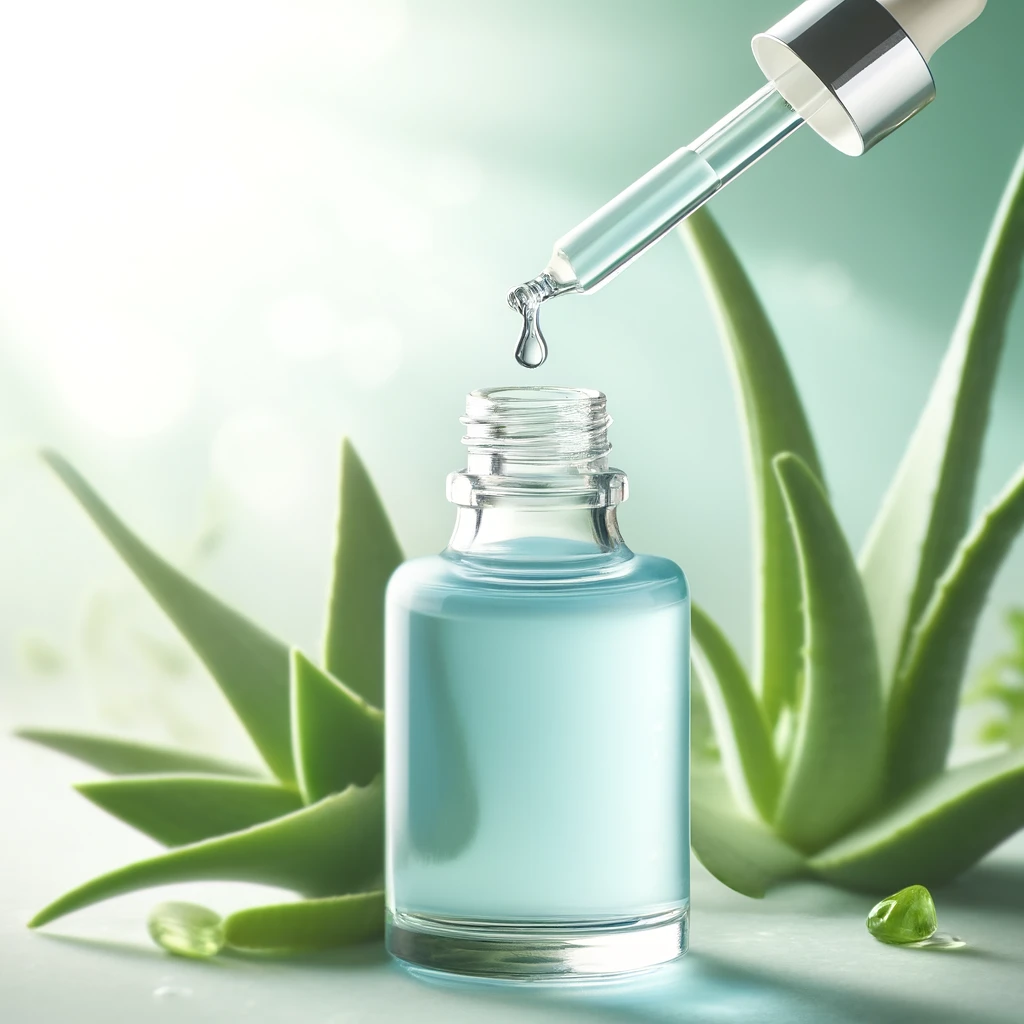Hyaluronic acid has become a cornerstone in skincare, celebrated for its profound hydrating properties and seemingly magical ability to plump and refresh ageing skin. This naturally occurring molecule, famed for holding up to 1000 times its weight in water, is a common ingredient in many moisturizers, serums, and facial masks.
As consumers increasingly pursue products that promise a dewy, youthful complexion, hyaluronic acid stands out as a preferred choice, particularly among those battling the signs of ageing.
However, for individuals with acne-prone skin, the approach to moisturization is fraught with caution. This skin type, characterized by frequent breakouts, excessive oiliness, and sensitivity, demands careful product selection to avoid exacerbating existing skin issues.
The critical concern is finding skincare solutions that hydrate and protect the skin without clogging pores or triggering acne flare-ups.
Given this backdrop, the primary focus of this article is to delve into the efficacy of hyaluronic acid for those with acne-prone skin. Is it the miracle moisturizer that can transcend skin types, or is its acclaim overshadowed by potential drawbacks for those prone to acne?
By examining scientific studies, dermatological opinions, and real-user experiences, we aim to uncover whether hyaluronic acid benefits those struggling with acne.
Understanding Hyaluronic Acid
Hyaluronic acid (HA) is a popular skincare buzzword and a naturally occurring polysaccharide in the human body, predominantly in the skin, connective tissues, and eyes. Its primary function is to retain water to keep tissues well-lubricated and moist.
In skincare, hyaluronic acid is harnessed for its unparalleled hydrating properties. It is pivotal in maintaining skin elasticity and resilience by effectively binding water molecules to the skin’s surface.
The Science Behind Hyaluronic Acid
On a molecular level, hyaluronic acid is remarkable for attracting and holding vast amounts of moisture—up to 1000 times its weight in water. This capability is due to its unique structure, consisting of long, disaccharide chains that create a dense, gel-like matrix in the skin.

This matrix not only fills the spaces between cells, enhancing their ability to retain water but also provides a hydrating barrier on the skin’s surface, which helps to reduce moisture loss in the dermal layers.
Varieties of Hyaluronic Acid
The benefits of hyaluronic acid in skincare are influenced significantly by its molecular weight, which affects its penetration and efficacy:
- High-Molecular-Weight Hyaluronic Acid (HA): HA has larger molecules that do not penetrate the skin but sit on its surface. Here, they hydrate the skin’s outermost layers by attracting environmental moisture. This helps to reduce the appearance of fine lines and wrinkles by plumping the skin.
- Low-Molecular Weight Hyaluronic Acid: Created through the hydrolysis of high-molecular-weight HA, these smaller molecules penetrate deeper into the skin’s layers. They are more effective in hydrating the skin from within, which can enhance skin elasticity and support repair mechanisms.
- Sodium Hyaluronate: This salt derivative of hyaluronic acid is smaller in molecular size compared to its native counterpart, making it easier to absorb. Sodium hyaluronate can reach deeper into the dermal structure, providing superior hydration and stimulating blood circulation to the skin cells.
- Hydrolyzed Hyaluronic Acid: Hydrolyzed HA is broken down into smaller fragments than sodium hyaluronate, allowing quick absorption and hydration of the skin’s deeper layers. It is particularly effective in healing and rejuvenating the skin from within.
Acne-Prone Skin Basics
Acne-prone skin is characterized by a propensity to develop acne, a common skin condition that involves the inflammation of the pores. This type of skin tends to produce excess sebum, the oily substance secreted by the sebaceous glands, which can lead to blocked pores, blackheads, whiteheads, and other forms of pimples.
Individuals with acne-prone skin may also experience varying degrees of redness, scarring, and sensitivity, which can complicate skincare routines and product selection.
How Acne Develops
The development of acne is primarily influenced by three factors:
- Oil Production: Excessive sebum production can create an environment prone to breakouts. Sebum is not harmful but can mix with dead skin cells and block pores when produced in excess.
- Bacteria: Propionibacterium acnes (P. acnes) is a bacteria that lives on the skin and is generally harmless. However, this bacteria can multiply rapidly when pores are blocked, leading to inflamed or infected pores.
- Inflammation: The body’s immune response to the blocked, bacteria-filled pore leads to inflammation, manifesting as the redness and swelling associated with acne.
Hormonal changes, stress, diet, and inappropriate skincare products often exacerbate these factors, making managing acne-prone skin particularly challenging.
Challenges in Moisturizing Acne-Prone Skin
Finding suitable moisturizers for acne-prone skin is a significant challenge. The ideal moisturizer for this skin type should:
- Be Non-Comedogenic: The product is specifically formulated not to block pores.
- Control Oil Production: Ingredients that help regulate sebum production without over-drying the skin are crucial.
- Include Anti-Inflammatory Properties: To help reduce the redness and swelling associated with acne.
- Be Lightweight and Oil-Free: Heavier, oil-based products can exacerbate acne, whereas water-based formulas are less likely to cause breakouts.
Hyaluronic Acid’s Benefits for Acne-Prone Skin
Hyaluronic acid is often hailed as a beneficial ingredient for all skin types, including those prone to acne. Its unique properties make it particularly appealing for managing the complex needs of acne-affected skin.

Moisturizing Properties
One of the primary advantages of hyaluronic acid for acne-prone skin is its ability to hydrate effectively without contributing to oiliness or clogging pores. Hyaluronic acid has a lightweight, gel-like texture, unlike many heavy, oil-based moisturizers that can exacerbate acne.
This allows it to provide moisture by binding water to the skin, thereby maintaining hydration levels without adding extra oil. This hydration is crucial because it helps to prevent the overproduction of sebum, which is often a response to dehydrated skin, thereby reducing the likelihood of further breakouts.
Potential Anti-Inflammatory Benefits
Hyaluronic acid also displays potential anti-inflammatory properties, which can reduce the redness and swelling associated with acne breakouts. While traditionally not recognized as an anti-inflammatory agent, recent studies suggest that hyaluronic acid can help moderate the body’s inflammation response, possibly due to its natural occurrence and crucial role in tissue repair and regeneration.
Evidence from Studies
Research into the specific effects of hyaluronic acid on acne-prone skin is still evolving, but some critical studies have highlighted its benefits:
- A study published in the Journal of Drugs in Dermatology found that formulations containing hyaluronic acid were effective at reducing the severity of acne when used in conjunction with standard acne treatments, suggesting a complementary role for hyaluronic acid in acne management.
- Another research piece highlighted that low molecular weight hyaluronic acid could penetrate deeper into the skin and provide hydration without aggravating acne symptoms, potentially aiding in acne scars’ healing process.
- Clinical trials have also indicated that skincare products containing hyaluronic acid improve skin hydration and elasticity, making them suitable for sensitive or compromised skin due to acne treatments like retinoids or benzoyl peroxide.
Debunking Myths: Hyaluronic Acid and Acne
Despite the benefits of hyaluronic acid for various skin types, there are several myths and misconceptions surrounding its use, particularly for acne-prone skin. Let’s address some of these myths and provide clarification based on expert opinions and dermatological advice.
Myth 1: Hyaluronic Acid Can Cause Breakouts
One of the most prevalent myths is that hyaluronic acid can cause acne breakouts. This misconception may stem from the need for more clarity between different types of skincare products. Unlike oils and certain emollients that can clog pores and exacerbate acne, hyaluronic acid is a humectant.
This means it draws moisture from the environment into the skin rather than forming an occlusive layer on top of it. Due to its nature and molecular structure, hyaluronic acid does not clog pores. Therefore, it is generally considered non-comedogenic and safe for use on acne-prone skin.
Myth 2: Hyaluronic Acid is Only for Dry Skin
Another common myth is that hyaluronic acid is only suitable for dry skin and not necessary or beneficial for oily or acne-prone skin types. However, hydration is crucial for all skin types, including oily and acne-prone.
Hyaluronic acid can provide moisture without adding oiliness, essential for balancing the skin’s hydration levels. Proper hydration can help regulate sebum production and minimize the chances of sebum overproduction—a common issue for acne-prone skin.
Expert Opinions and Dermatological Advice
Dermatologists widely recommend hyaluronic acid for its versatility and gentle nature, making it suitable for even sensitive and breakout-prone skin. Experts suggest looking for serums or moisturizers that combine hyaluronic acid with other beneficial ingredients, such as niacinamide or salicylic acid, which can help manage acne.
Moreover, it’s essential to consider the molecular weight of the hyaluronic acid used in products. As previously mentioned, lower molecular weights can penetrate deeper. They may offer better healing and anti-inflammatory benefits, while higher molecular weights are excellent for surface hydration and protecting the skin barrier.
How to Use Hyaluronic Acid for Acne-Prone Skin
Incorporating hyaluronic acid into a skincare routine designed for acne-prone skin can significantly enhance skin hydration and overall health without worsening acne symptoms. Here’s how to effectively include this powerful ingredient in your skincare regimen.

Best Practices for Incorporating Hyaluronic Acid
- Cleanse Gently: Start with a gentle cleanser to remove dirt and excess oils without stripping the skin. Clean skin ensures better absorption of hyaluronic acid.
- Apply to Damp Skin: Hyaluronic acid works best when applied to slightly damp skin, as it draws moisture into the skin. After cleansing, leave your skin wet or apply a hydrating toner before using a hyaluronic acid serum.
- Layer Correctly: Apply a hyaluronic acid serum before heavier creams or oils. This helps lock in the hydration provided by hyaluronic acid.
- Use AM and PM: Incorporate hyaluronic acid into your morning and nighttime skincare routines for best results. Follow up with sunscreen in the morning to protect your hydrated skin from UV damage.
- Adjust Quantity as Needed: Use only a pea-sized amount of hyaluronic acid serum or gel. Over-application won’t increase benefits and might leave a sticky residue.
Recommended Products
When selecting products containing hyaluronic acid for acne-prone skin, look for formulations featuring ingredients that combat or prevent acne. Some recommended products include:
- The Ordinary Hyaluronic Acid 2% + B5 is a budget-friendly option that combines vitamin B5 for enhanced hydration and skin healing properties.
- La Roche-Posay Hyalu B5 Hyaluronic Acid Serum: Formulated for sensitive skin, this serum is non-comedogenic and contains soothing vitamin B5.
- Neutrogena Hydro Boost Gel-Cream: This oil-free formula is perfect for acne-prone skin needing extra hydration without a heavy feel.
- CeraVe Hydrating Hyaluronic Acid Serum: Designed with ceramides and vitamin B5, this serum helps maintain the skin’s natural barrier while providing hydration.
Tips on What to Look for in Product Labels
- Non-Comedogenic: Ensure the product is labelled as non-comedogenic, which means it’s formulated not to clog pores.
- Oil-Free: Opt for oil-free products if your skin is oily or sensitive to breakouts.
- Ingredient Concentration: Look for products where hyaluronic acid is listed near the top of the ingredient list, indicating a higher concentration.
- Complementary Ingredients: Products containing ingredients like salicylic acid, niacinamide, or tea tree oil can provide additional acne-fighting benefits.
- Fragrance-Free and Paraben-Free: These formulations are less likely to irritate sensitive, acne-prone skin.
Real People, Real Results: Case Studies and Reviews
The effectiveness of hyaluronic acid for acne-prone skin can be illustrated through clinical studies and real-life experiences. Here, we explore how individuals with acne-prone skin have benefited from incorporating hyaluronic acid into their skincare routines, backed by personal anecdotes and visible results.
Summaries of Case Studies
- Case Study 1: A study involving 53 participants with oily and acne-prone skin used a serum containing hyaluronic acid twice daily for 8 weeks. Results showed a significant decrease in sebum production and improved skin hydration without triggering new acne outbreaks.
- Case Study 2: Another case involved an individual with persistent adult acne who introduced a hyaluronic acid-based moisturizer into their routine. Over three months, the participant noted reduced acne severity, enhanced skin texture, and less post-acne scarring, suggesting the moisturizer helped improve skin barrier function and healing.
Analysis of Consumer Reviews and Feedback
Consumer feedback from various online skincare forums and communities generally reflects positive experiences with hyaluronic acid products:
- Many users reported that serums containing hyaluronic acid provided deep hydration without adding oiliness or causing breakouts.
- Reviews on platforms like Reddit’s r/SkincareAddiction and Amazon often highlight products like Neutrogena Hydro Boost and The Ordinary Hyaluronic Acid 2% + B5 for their effectiveness in balancing moisture levels in acne-prone skin.
- Some users noted that while hyaluronic acid helped with hydration, comprehensive acne control required targeted treatments alongside the HA products.
Before and After Comparisons
Photographic evidence from before and after comparisons often showcases visible improvements in skin hydration and texture:
- Before: Users typically show photos with dehydrated, flaky skin and visible acne.
- After: After images usually display a noticeable reduction in surface dryness, a plumper skin appearance, and, in many cases, a reduction in the severity of acne and inflammation.
These real-world examples underscore the potential of hyaluronic acid as a beneficial addition to the skincare routines of those with acne-prone skin.
The collective feedback and visual evidence from case studies and consumer reviews suggest that hyaluronic acid can be crucial in managing hydration while respecting the delicate balance required to maintain clear skin.
Throughout this article, we have examined the role of hyaluronic acid in the context of acne-prone skin, delving into its hydrating properties, potential anti-inflammatory benefits, and the real-world experiences of individuals who have incorporated it into their skincare routines.
The evidence gathered from scientific research and anecdotal testimonies supports the notion that hyaluronic acid can be an effective moisturizer for acne-prone skin without exacerbating acne conditions.
Final Thoughts: Miracle Moisturizer or Myth?
Hyaluronic acid is not a cure-all for acne, but it is certainly not a myth regarding its effectiveness in moisturizing acne-prone skin. It offers a unique combination of deep hydration and gentle formulation, making it suitable for those struggling with traditional, heavier moisturizers that can clog pores and trigger breakouts.
Its ability to enhance skin hydration while maintaining a lightweight feel helps manage sebum levels and supports the skin’s natural barrier, contributing to overall skin health.
However, while hyaluronic acid can be a valuable addition to an acne skincare regimen, it should not be considered a standalone treatment. It works best when used in conjunction with other targeted treatments and under the guidance of skincare professionals.
Consultation with Dermatologists
Given the complexities of acne-prone skin, it’s essential to tailor skincare products and routines to individual needs. Consult a dermatologist before significantly changing your skin care regimen, mainly when introducing active ingredients like hyaluronic acid.
A dermatologist can provide personalized advice based on your skin type, condition, and medical history, ensuring that any new skincare routine, such as hyaluronic acid, contributes positively to your skin’s health without unintended consequences.
10 FAQs About Hyaluronic Acid for Acne-Prone Skin: Miracle Moisturizer or Myth?
Q: What is hyaluronic acid, and how does it work?
Ans: Hyaluronic acid (HA) is a naturally occurring substance in the skin, known for its capacity to attract and retain large amounts of moisture. In skin care, HA helps to hydrate and plump the skin by drawing water from the environment, enhancing the skin’s moisture content without adding oil.
Q: Is hyaluronic acid good for acne-prone skin?
Ans: Yes, hyaluronic acid benefits acne-prone skin by hydrating the skin without clogging pores or adding excess oil. Its moisturizing properties help to maintain a balanced skin environment, which can prevent the overproduction of sebum—a common factor in the development of acne.
Q: Can hyaluronic acid cause breakouts?
Ans: No, hyaluronic acid itself does not cause breakouts. It is non-comedogenic, meaning it does not clog pores. However, always check other ingredients in HA products, as some formulations might contain additional components that could irritate sensitive skin or cause acne.
Q: How should hyaluronic acid be used in a skincare routine for acne-prone skin?
Ans: Hyaluronic acid should be applied to slightly damp skin after cleansing. If needed, use a lightweight, water-based serum with HA, followed by a non-comedogenic moisturizer.
Q: What type of hyaluronic acid is best for acne-prone skin?
Ans: For acne-prone skin, look for products with low molecular weight hyaluronic acid, which can penetrate deeper into the skin without exacerbating acne, providing hydration and supporting healing processes beneath the skin’s surface.
Q: How often should someone with acne-prone skin use hyaluronic acid?
Ans: Using hyaluronic acid twice daily is safe as part of your morning and evening skincare routines. Regular use can help maintain optimal hydration levels, which is essential for controlling oil production and minimizing acne flare-ups.
Q: Are there any side effects of using hyaluronic acid on acne-prone skin? Hyaluronic Ans: acid is generally well-tolerated and doesn’t usually cause side effects. However, if you are using multiple new products simultaneously, it’s best to introduce them one at a time to monitor how your skin reacts.
Q: Can hyaluronic acid help with acne scars?
Ans: While hyaluronic acid primarily works by hydrating the skin, its skin-repairing and rejuvenating properties can also aid in the appearance of smoother skin, potentially reducing the visibility of acne scars over time.
Q: What should I look for when choosing a hyaluronic acid product for acne-prone skin?
Ans: Seek out products labelled as “non-comedogenic” and “oil-free.” Opt for serums or gels rather than heavy creams. Additionally, choosing formulations enhanced with ingredients like niacinamide can provide extra benefits, such as reducing inflammation and improving skin texture.
Q: Can I use hyaluronic acid with other acne treatments?
Ans: Yes, hyaluronic acid and other acne treatments like benzoyl peroxide or salicylic acid can be used. It can help counteract the drying effects of many acne medications, maintaining skin hydration without interfering with the effectiveness of your treatments.

